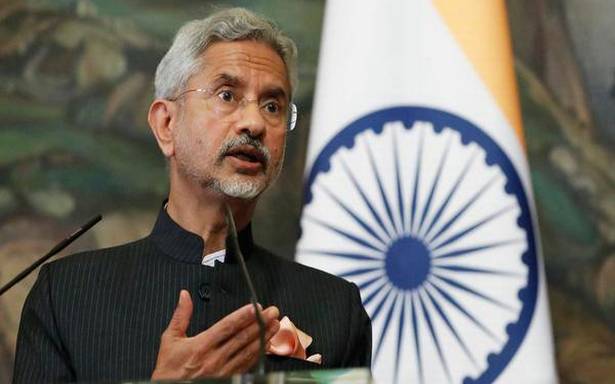External Affairs Minister to meet Pak, Chinese counterparts
External Affairs Minister S. Jaishankar travels to Central Asia on Tuesday for two back-to-back meetings focusing on Afghanistan, which will see him face-to-face with the foreign ministers of both Pakistan and Chinaas well as at the same conference as Pakistan Prime Minister Imran Khan, Afghanistan President Ashraf Ghani and U.S. Special Envoy Zalmay Khalilzad.
Mr. Jaishankar will first attend the Shanghai Cooperation Organisation (SCO) ministerial in Dushanbe on July 13-14 after which he will travel to Tashkent for a regional connectivity conference on July 15-16.
Although Mr. Jaishankar has been at the same venue as the Pakistan Foreign Minister Shah Mehmood Qureshi at least twice in the past few months, the SCO meeting marks the first time he will be in the room with Chinese Foreign Minister Wang Yi, since the two met in Moscow last September, when they agreed to de-escalate tensions at the Line of Actual Control.
However, the agreement has yet to be fully implemented on the ground. The MEA declined to comment on whether Mr. Jaishankar and Mr. Wang will have a separate meeting at either of the two venues that both will travel to.
Also read: As Taliban gains control of Afghanistan, students fear return to dark days
The focus of both meetings is expected to be the deteriorating security situation in Afghanistan and regional solutions for the country in the wake of the U.S. and NATO troops pull-out, said organisers.
Dushanbe will host a special SCO-contact group meeting of eight member states (Russia, India, China, Pakistan and Central Asian states) with Afghanistan Foreign Minister Hanif Atmar on July 14. Significantly, the contact group, which normally meets at the level of Deputy Foreign Ministers, is being upgraded this time, and all foreign ministers are expected to give a joint statement on Afghanistan.
The statement will be of particular importance as the Taliban has stepped up violence in the country, and Taliban militants claim they are taking over more towns and cities from the Afghan forces, which led to India pulling all its staff out of the Kandahar Consulate on Saturday. Afghanistan was high on the agenda of Mr. Jaishankar’s meetings in Tehran and Moscow last week as well.
In Tashkent, Uzbekistan President Shavkat Mirziyoyev will make a greater push for trade connectivity between South and Central Asia, including discussing the importance of the Chabahar project with India and signing a transit trade agreement (TTA) with PM Khan that will give Uzbekistan access to Pakistani ports, benefitting trade with Afghanistan as well.
“Afghanistan is not just a neighbour, but a part of our region. Presently it is seen by some as a source of problems and threats, but it is also a source of possibilities, and the President feels that the foremost purpose of this conference is to strengthen connectivity, including through Afghanistan,” Uzbekistan Ambassador to India Dilshod Akhotov told The Hindu in an interview. He added that Afghanistan would be included in the Uzbekistan-India-Iran trilateral in the future, and plans for a Preferential Trade Agreement (PTA) with India were also under consideration.
“The most important goal is for Uzbekistan, which the only double landlocked country in the world other than Liechtenstein, to build a bridge to the South Asian region. Through our southern neighbours we want to access the seas, and the closest is the Indian ocean,” Mr. Akhotov added.
At the conference entitled “Central and South Asia: Regional Connectivity, Challenges and Opportunities”, Mr. Mirziyoyev will project Uzbekistan as the Central Asian fulcrum and key country in the Intra-Afghan peace process, that has, in the past, hosted Taliban delegations for talks.
Mr. Ghani and Mr. Khan will participate together at the inaugural session of the Conference on Friday, which will be addressed virtually by UN Secretary General Guterres, and followed by a plenary session with speeches by Mr. Jaishankar, Chinese FM Wang Yi, Russian FM Sergey Lavrov, and ministers and senior officials from other Central Asian countries, Bangladesh, Sri Lanka (virtually), Gulf States, the U.S. and the European Union.
Source: Read Full Article

